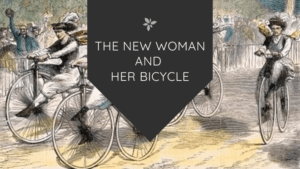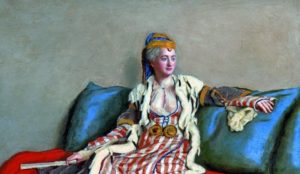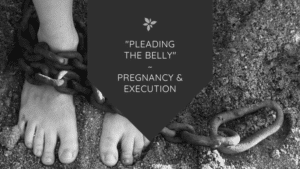Charlotte Perkins Gilman was a feminist writer, lecturer, and thinker at the turn of the 20th century. Despite her lack of formal education, she authored Women in Economics, a foundational text of early feminism, and became known as a preeminent sociologist, philosopher, and social critic. Her works of fiction represented the psychological impact of traditional female roles on housewives and mothers, and her utopian novel Herland inspired Dr. William Moulton Marsten to create his character Wonder Woman as a model of “strong, free, courageous womanhood.”
Charlotte was born into the prominent Beecher family – famous for author and abolitionist Harriet Beecher Stowe and suffragist Isabella Beecher Hooker – but her father abandoned her when she was young, leaving the family in poverty.
Charlotte received almost no formal education, describing her schooling as “four years among seven different institutions, ending when I was fifteen.” Despite this, she attended the Rhode Island School of Design from 1878 to 1883, and financed her education by providing drawing lessons, painting advertisements for soap companies, and selling watercolors.
[bctt tweet=”Charlotte Perkins Gilman’s utopian novel Herland inspired the character of #WonderWoman”]
At 21, Charlotte married her first husband Charles Walter Stetson, despite her vow at an early age to remain unmarried and devote her life to public service. Soon after she gave birth to her daughter Katharine, but she realized early on that she was unsatisfied with life as a housewife and mother. Scholar Cynthia Davis writes that “that before marrying Stetson, Gilman insisted he swear that he’d never expect her to cook or clean and never require her, ‘whatever the emergency, to DUST!’”
After her pregnancy, Charlotte fell into a deep depression that lingered throughout her life, and was treated with the “rest cure,” a period of forced inactivity prescribed primarily to women diagnosed with hysteria or nervous disorders. Her sense of boredom and inadequacy only worsened during this period; later she would write her famous work, “The Yellow Wallpaper,” about a woman forced to undergo the same treatment who goes mad while imprisoned in her bedroom for weeks.
[bctt tweet=”‘There is no female mind. Might as well speak of a female liver.’ ~ Charlotte Gilman”]
Charlotte soon realized that the best cure for her depression was independence.
At a time when divorce was still scandalous, [Gilman] divorced Stetson, but she also facilitated his remarriage to her best friend, Grace Channing, with whom Gilman remained close. She then sent her nine-year-old daughter back east to be raised by the new couple.
Rescinding her role as wife and mother, Charlotte moved to Pasadena, CA and lived their briefly with her daughter, before sending her back east to live in more traditional society with her father and stepmother.

It was during these years that Charlotte authored her most famous texts – her short story “The Yellow Wallpaper,” (1892), first novel In This Our World (1893) and critical work Women in Economics (1898) were all published in the years after her divorce. During this period, Charlotte had a long affair with Adeline Knapp, an author, journalist, and suffragette associated with the San Francisco Bay area. After their affair fizzled out, Charlotte married her cousin and second husband George Houghton Gilman, “a man supportive of her career goals and willing to accept them.”
Later in her life, Charlotte began to tour and lecture on social politics and philosophy. She started a magazine called The Forerunner, which ran from 1909 until 1916 and published essays, fiction, and poetry, including a serialized version of her utopian novel Herland.
George Houghton Gilman died in 1934, and soon after Charlotte was diagnosed with inoperable breast cancer. Always devoted to her usefulness, Charlotte committed suicide three years later. Her suicide note was published in the newspapers, and read in part “When all usefulness is over, when one is assured of unavoidable and imminent death, it is the simplest of human rights to choose a quick and easy death in place of a slow and horrible one.”

Charlotte’s legacy of spitfire feminism, economic empowerment for women, and a more just and egalitarian society lives on in the work of modern activists and organizations devoted to social progress. Her feminist utopian novels, in which women live separate from men on an island and use parthenogenesis to reproduce, were some of the first imaginings of science fiction, and are widely acknowledged as foundational texts for William Morsten’s creation of Wonder Woman.
Charlotte demonstrated that that women were strong and capable through her own recovery and independence, proving that:
It is not that women are really smaller-minded, weaker-minded, more timid and vacillating, but that whosoever, man or woman, lives always in a small, dark place, is always guarded, protected, directed and restrained, will become inevitably narrowed and weakened by it.
Recommended Reading


References
- Charlotte Perkins Gilman Society: About Charlotte Perkins Gilman
- Radcliffe Magazine: The Evolution of Charlotte Perkins Gilman
- Women’s Intellectual Contributions to the Study of Mind and Society: Charlotte Perkins Gilman (1860-1935)
- LibriVox: Herland
- About.com Women’s History: Charlotte Perkins Gilman Quotes
- The New Yorker: The Last Amazon
- Science Museum: Rest cure
- Spokeo: Adeline Knapp (Writer)
- Imaginary Worlds Podcast: Episode 35: Imagining Wonder Woman
Rebecca Valley is a poet, writer, and amateur baker currently living in Olympia, Washington. Her poems have appeared recently in Through the Gate and Clementine (Unbound), and you can find more of her history articles on Atlas Obscura.





I’ve read the post with wonderful satisfaction and even could understand something new I will use for my further requirements.
The guide is bright and clear, without the further useless details
or else. The speech is equally brilliant and vibrant, so the further I read,
the more I really do enjoy it! Besides, the info is quite cutting-edge, so like it.